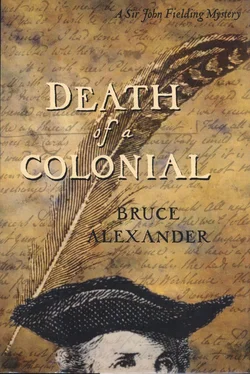Bruce Alexander - Death of a Colonial
Здесь есть возможность читать онлайн «Bruce Alexander - Death of a Colonial» весь текст электронной книги совершенно бесплатно (целиком полную версию без сокращений). В некоторых случаях можно слушать аудио, скачать через торрент в формате fb2 и присутствует краткое содержание. Год выпуска: 1999, ISBN: 1999, Издательство: Putnam Adult, Жанр: Исторический детектив, на английском языке. Описание произведения, (предисловие) а так же отзывы посетителей доступны на портале библиотеки ЛибКат.
- Название:Death of a Colonial
- Автор:
- Издательство:Putnam Adult
- Жанр:
- Год:1999
- ISBN:9780425177020
- Рейтинг книги:3 / 5. Голосов: 1
-
Избранное:Добавить в избранное
- Отзывы:
-
Ваша оценка:
- 60
- 1
- 2
- 3
- 4
- 5
Death of a Colonial: краткое содержание, описание и аннотация
Предлагаем к чтению аннотацию, описание, краткое содержание или предисловие (зависит от того, что написал сам автор книги «Death of a Colonial»). Если вы не нашли необходимую информацию о книге — напишите в комментариях, мы постараемся отыскать её.
Death of a Colonial — читать онлайн бесплатно полную книгу (весь текст) целиком
Ниже представлен текст книги, разбитый по страницам. Система сохранения места последней прочитанной страницы, позволяет с удобством читать онлайн бесплатно книгу «Death of a Colonial», без необходимости каждый раз заново искать на чём Вы остановились. Поставьте закладку, и сможете в любой момент перейти на страницу, на которой закончили чтение.
Интервал:
Закладка:
“Be that as it may, Sir John, I believe you’ve been bested, so if you, young man, will come over here and sit down at this secretaire, you will find paper in the drawer and pen and ink in the usual place. So come now, lad, hop to it, if you will, and we’ll begin.”
In just such a way, then, did I become recording secretary for this mysterious commission with neither name nor, to my knowledge, a purpose made public. Looking upon the members of the commission from my new vantage point, I must say I found them a motley group, as different one from the other as January from July, Sir John had withdrawn into himself following the friendly dispute with the Lord Chief Justice; eyes covered by the familiar black silk band, features at rest, he looked to be as one asleep. Mr. Trezavant, on the other hand, seemed wakeful indeed, yet he seemed solely concerned with ingratiating himself with the others — flashing little smiles here, and there and even at me, looking round the room in such a way that he seemed to be taking stock of it, tallying the worth of this piece of furniture and that set of books. Of the two later arrivals, I fear that I liked Mr. Dalrymple the better of the two, for no good reason except that he was the better dressed, handsome in the blue-eyed way of Dutchmen and Swedes, and was the more commanding presence. Mr. Hemmings, sharp-eyed and intelligent-looking, also had that manner of viewing things in the room as if assessing their value, yet there seemed no element of envy or greed involved in this habit of his; one had the feeling that his was simply a practiced professional eye which never rested. And as for William Murray, Earl of Mansfield, the Lord Chief Justice, I had come to know him fairly well during his flying visits to Sir John; and him I judged to be proud (often excessively so), and one who bore the traits of many proud men: a choleric disposition and an overweening certainty of the rightness of his own causes and opinions; these led him often to a certain callousness in the dispensation of justice; he was by reputation, inclination, and practice, a hanging judge.
Yet say what you would of Lord Mansfield, he matched Sir John in the quality of his directness. In fact, the two men were in that way and others a bit alike. So it was that I was not in the least surprised when, echoing Sir John, the chairman of the commission (Lord Mansfield, of course) began by announcing to the little group that the purpose of the commission was to save the Laningham fortune for the King.
“Save it?” echoed Mr. Trezavant. “Why should that be necessary? It is his by law, is it not? That fellow Paltrow was condemned to hang, and, by God, thanks to Sir John here, he was hanged.”
At the mention of his name, I noticed Sir John wince slightly. He said nothing, however.
“I fear I must correct you on that, sir,” said Mr. Dalrymple. “The possessions of a condemned man go to the King by custom.”
“It is, however, a very old custom,” said Lord Mansfield.
“And a very bad one,” said Sir John.
“Now, none of that,” said Lord Mansfield, mildly reproving as one might correct a child. “We are not here to judge the custom but, rather, to see that it is followed. “
“But again I ask, why should it not be?” This, most insistently, from Mr. Trezavant. “It is doubly the King’s, is it not? I understood that this Paltrow who was hanged was last in the line. Unless some distant cousin step forward and prove his claim to the Laningham title, the fortune would, under those circumstances, also go to the King.”
There was silence for a moment.
“Would it not?” repeated Mr. Trezavant. He looked about uneasily.
Again silence — until Lord Mansfield at last spoke up: “Well, that, you see, is the problem. A claimant to the Laningham title has, in fact, appeared — and he is no distant cousin but a younger brother. His name is Lawrence Paltrow.”
“Where has he been all this time?” asked Sir John.
“In the North American colonies. In fact, he quite disappeared eight years ago and was presumed to be dead. Not a word was heard from him all that time — until he read of his brother’s death and realized that he was next in line. Or that, in any case, is what is told by this supposed younger brother.”
“You are doubtful, then, Lord Mansfield?”
“Indeed I am.”
“Well, that is good,” said Sir John, “for much as I dislike being the bearer of bad tidings, I think it only fair to tell you that the King has not a chance of claiming the Laningham fortune under the first set of circumstances you discussed — that is, seizing the properly of a man condemned.”
There was a moments quiet, followed by a flurry of talk — exclamations of surprise, challenges, demands to know on what he based this strange conclusion.
“Yes, Sir John,” said Lord Mansfield in his most sarcastic manner, “whence comes this sudden revelation?”
“Why, it came unbidden and but a moment ago. I had felt that there was something false in accepting Arthur Paltrow as Lord Laningham — that is, for purposes of royal seizure — and then, of a sudden, did the reason occur to me. It had meant so much to Arthur Paltrow that he properly be considered Lord Laningham that he wrote demanding to be tried before the House of Lords. Do you recall that, Lord Chief Justice?”
“Hmmm. Something about it, yes.”
“Then you may also recall the reason for which he was denied such a trial. He was advised that though he had, immediately following the death of his uncle, submitted his Letter of Patent, claiming a seat in the House of Lords, the Writ of Summons to Parliament had not yet been issued. The fact that he was now bound for trial at Old Bailey on a charge of homicide made it highly unlikely that the Writ would ever be issued — except in the unlikely event that he be found not guilty. Now, gentlemen, as we all know, he was found guilty and suffered death by the rope. He died as a commoner and not as a noble. The King cannot lay claim to the Laningham fortune through the death of Arthur Paltrow, for it was never Paltrow’s. According to the House of Lords, he was never one of them. He cannot be posthumously granted what he was once denied solely for purposes of seizure. Such a tactic would be beneath the King. It would also, I hope, be beneath the Kings lawyers.”
Let me interject here that as I listened to the short discourse quoted above, taking notes upon Sir Johns words as he spoke them, I was so delighted by the strength of his reasoning and the felicity of his expression that I felt the impulse to applaud him when he had done. I resisted it, of course, and a good thing, too, for I looked up from my notes to find the faces of the other four commission members wearing expressions of the deepest consternation. It was certain that none would have joined me in paying tribute to him.
When at last he and the rest had recovered from the blow dealt them, Lord Mansfield spoke up most soberly. “You would advise, then,” said he, “that we take the matter of the claimant most seriously and concentrate upon defeating his efforts.”
“That would seem to me a reasonable conclusion,” said Sir John. “Perhaps you could tell us more of this Lawrence Paltrow. How does he account for his silence during the eight years he was presumed to be dead?’’
“Oddly enough, he can give no explanation for his silence, nor does he apparently feel the need to do so.”
“How can that be?” asked Mr. Dalrymple. “The fellow has simply appeared and made his claim, has he? Does he refuse to answer questions? How is he now occupied?”
“What occupies him chiefly since his appearance here in England is the business of collecting signed statements attesting to his identity as Lawrence Paltrow.”
Читать дальшеИнтервал:
Закладка:
Похожие книги на «Death of a Colonial»
Представляем Вашему вниманию похожие книги на «Death of a Colonial» списком для выбора. Мы отобрали схожую по названию и смыслу литературу в надежде предоставить читателям больше вариантов отыскать новые, интересные, ещё непрочитанные произведения.
Обсуждение, отзывы о книге «Death of a Colonial» и просто собственные мнения читателей. Оставьте ваши комментарии, напишите, что Вы думаете о произведении, его смысле или главных героях. Укажите что конкретно понравилось, а что нет, и почему Вы так считаете.












